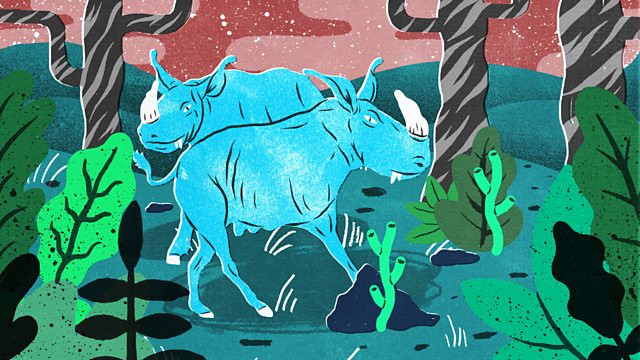Pain or No Pain?
Professor Christine Nicol explores the meaty problem of eating aliens and how to choose. Jake the spaceman crashes on a planet and has to eat the locals. Do they feel pain?
In this 4 part series Christine Nicol, professor of Animal Welfare at the University of Bristol, explores the fascinating and challenging subject of animal sentience and welfare. To help delve into the nuances we set up an intriguing scenario, Jake the Spaceman (aka comedian Jake Yapp) has crash-landed on a remote planet and doesn't have much food to keep him going until he is rescued. Fortunately, the planet is teeming with alien life forms that are edible, but which ones should he eat?
He wants to cause the minimum amount of pain and distress to the creatures, so what does he need to know about the nature of the beings on the planet? Can they feel pain? If so, how can he minimise suffering? Will eating an alien cause distress to others? Is the alien so aware and sensitive to its environment that Jake needs to consider whether it is a non-human person?
Christine will interview animal welfare scientists, philosophers and wildlife biologists to get under the skin of animal sentience and the potential consequences of accepting that animals are conscious, aware creatures. These big questions generate surprising and challenging insights into our attitudes to other life. When you know absolutely nothing about the alien in front of you, what do you need to know before eating it?
Last on
Professor Brian Key

In addition, he oversees the teaching of Developmental Biology in the Science curriculum at the University of Queensland. Brian teaches developmental biology at all levels of the undergraduate experience.
Professor Georgia Mason

In 2015, she received a for her research across a range of species; for increasing understanding of the relationships between animal husbandry and animal welfare; and for being a role model and mentor to the next generation of animal welfare scientists.
Professor David Mellor

Along with Professor Georgia Mason, Mellor was awarded the Universities Federation for Animal Welfare medal in 2015 – becoming one of only nine scientists in the world to receive the award.
Professor Mike Mendl

His exceptional achievements in the advancement of animal welfare over many years were when he was awarded the for outstanding contributions to animal welfare science in 2014, and the 2015 .
Professor Peter Singer

He is known especially for his work on the ethics of our treatment of animals, for his controversial critique of the sanctity of life ethics in bioethics, and for his writing on the obligations of the affluent to aid those living in extreme poverty. He first became well-known internationally after the publication of . In 2011, Time included Animal Liberation on its “All-TIME” list of the 100 best non-fiction books published in English since the magazine began, in 1923.
Picture: Denise Applewhite - Princeton University
Dr Lynne Sneddon

Her studies are aimed at enhancing our understanding of the genes involved in the mechanisms of aggressive behaviour.
Dr James Yeates

Broadcast
- Wed 9 Dec 2015 21:00����ý Radio 4
What is Online First?
An explanation of Online First.

